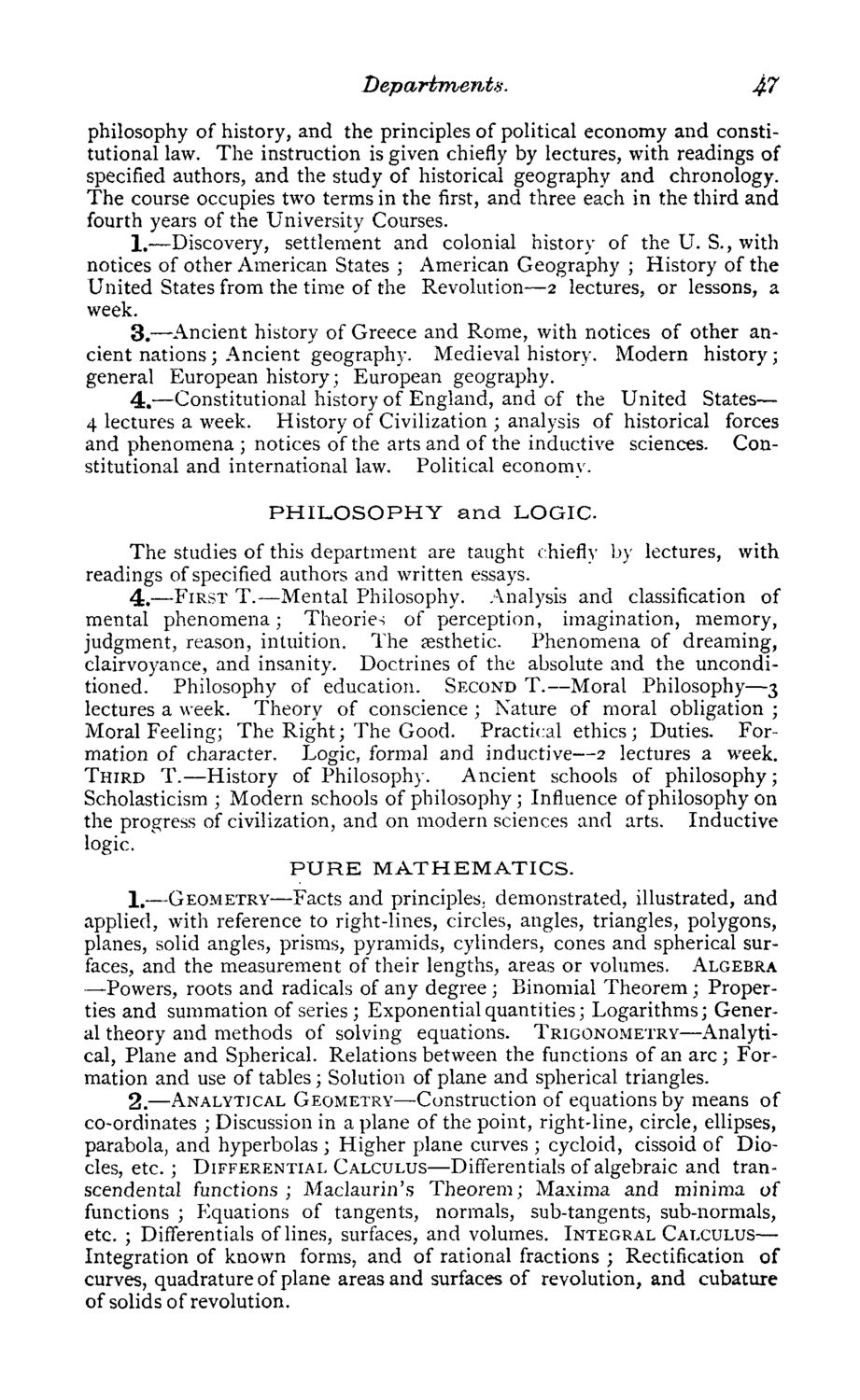| |
| |
Caption: Course Catalog - 1872-1873
This is a reduced-resolution page image for fast online browsing.

EXTRACTED TEXT FROM PAGE:
Departments. £7 philosophy of history, and the principles of political economy and constitutional law. The instruction is given chiefly by lectures, with readings of specified authors, and the study of historical geography and chronology. The course occupies two terms in the first, and three each in the third and fourth years of the University Courses. 1.—Discovery, settlement and colonial history of the U. S., with notices of other American States ; American Geography ; History of the United States from the time of the Revolution—2 lectures, or lessons, a week. 3.—Ancient history of Greece and Rome, with notices of other ancient nations; Ancient geography. Medieval history. Modern history; general European history; European geography. 4.—Constitutional history of England, and of the United States— 4 lectures a week. History of Civilization ; analysis of historical forces and phenomena ; notices of the arts and of the inductive sciences. Constitutional and international law. Political economy. P H I L O S O P H Y a n d LOGIC. The studies of this department are taught chiefly by lectures, with readings of specified authors and written essays. 4.—FIRST T.—Mental Philosophy. Analysis and classification of mental phenomena; Theories of perception, imagination, memory, judgment, reason, intuition. The aesthetic. Phenomena of dreaming, clairvoyance, and insanity. Doctrines of the absolute and the unconditioned. Philosophy of education. SECOND T.—Moral Philosophy—3 lectures a week. Theory of conscience ; Nature of moral obligation ; Moral Feeling; The Right; The Good. Practical ethics; Duties. Formation of character. Logic, formal and inductive—2 lectures a week. THIRD T.—History of Philosophy. Ancient schools of philosophy; Scholasticism ; Modern schools of philosophy; Influence of philosophy on the progress of civilization, and on modern sciences and arts. Inductive logic. PURE MATHEMATICS. 1.—GEOMETRY—Facts and principles, demonstrated, illustrated, and applied, with reference to right-lines, circles, angles, triangles, polygons, planes, solid angles, prisms, pyramids, cylinders, cones and spherical surfaces, and the measurement of their lengths, areas or volumes. ALGEBRA —Powers, roots and radicals of any degree; Binomial Theorem; Properties and summation of series; Exponential quantities; Logarithms; General theory and methods of solving equations. TRIGONOMETRY—Analytical, Plane and Spherical. Relations between the functions of an arc; Formation and use of tables; Solution of plane and spherical triangles. 2.—ANALYTICAL GEOMETRY—Construction of equations by means of co-ordinates ; Discussion in a plane of the point, right-line, circle, ellipses, parabola, and hyperbolas ; Higher plane curves ; cycloid, cissoid of Diocles, etc. ; DIFFERENTIAL CALCULUS—Differentials of algebraic and transcendental functions; Maclaurin's Theorem; Maxima and minima of functions ; Equations of tangents, normals, sub-tangents, sub-normals, etc. ; Differentials of lines, surfaces, and volumes. INTEGRAL CALCULUS— Integration of known forms, and of rational fractions ; Rectification of curves, quadrature of plane areas and surfaces of revolution, and cubature of solids of revolution.
| |